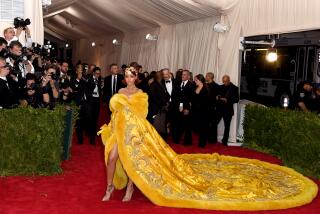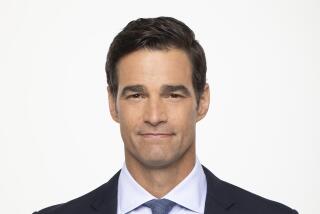Disney Chairman Isn’t in the Happiest Place
George J. Mitchell has privately complained to friends for months about the demands of being Walt Disney Co. chairman.
He didn’t want the position. Even in the best of times, the board chairmanship of such an enormous entertainment conglomerate requires long hours and thick skin. He was pushed into the job -- and the spotlight -- after a shareholder revolt last March prompted the board of directors to strip Chief Executive Michael Eisner of his chairmanship. From Day One, it was a job that would try even a diplomat’s patience.
Last week it got even harder. With Eisner’s announcement that he will retire in 2006, Mitchell must not only help restore stability to a company rocked by controversy but also lead the high-profile search for a new CEO. Along the way, the former U.S. senator and veteran peacemaker is sure to be tested by dissatisfied investors, dissident former board members and, some believe, by Eisner himself.
Mitchell is used to quelling tensions. He is, after all, the man President Clinton once sent to calm the waters in Northern Ireland. But rarely has the popular Maine Democrat, who once was reelected to the Senate with 81% of the vote, found himself accused of being part of the problem, not the solution. Mitchell was stung when the same shareholders who rose up against Eisner also slapped him with a 24% no-confidence vote.
Now the 71-year-old lawyer is faced with a responsibility that could enhance -- or tarnish -- his carefully polished image in both the corporate and political worlds.
“He’s got everything to lose and nothing to win,” said one longtime Mitchell associate, who spoke on the condition that he not be named. Mitchell is no quitter, the associate said, but “he wants out as soon as he can. It’s a totally thankless job.”
Mitchell, whose annual compensation package is valued at $500,000, says he can handle it.
“I served for six years as U.S. Senate majority leader. Managing multiple responsibilities isn’t a new thing for me,” he said Thursday. “I expected [the chairmanship] to be challenging. And it has been.”
Among the hard realities he faces is that potential candidates for Eisner’s job aren’t beating a path to Disney’s door, suggesting that an executive search could be a drawn-out affair. Many on the short list of possible successors, including News Corp.’s Peter Chernin and Yahoo Inc.’s Terry Semel, are happy where they are. Some, such as EBay CEO Meg Whitman, have gone out of their way to make clear they have no interest in leading Disney.
The search for an heir to the Disney throne also could put a strain on Mitchell’s relationship with Eisner. The two men have forged a close alliance since Mitchell joined the Disney board in 1995, and Mitchell went to bat for Eisner this year, lobbying pension funds and publicly supporting Disney management in the face of a hostile takeover bid by cable giant Comcast Corp.
But Eisner’s decision to back an internal candidate -- Disney President Robert Iger -- and his repeated suggestion that he might once again become board chairman have put pressure on Mitchell to establish himself as a more independent voice. The selection of Iger by the board could only strengthen the perception that Mitchell is doing Eisner’s bidding.
“For Mitchell this is one of those acid tests,” said Charles Elson, a corporate governance expert at the University of Delaware. “To date he’s been a very strong supporter of Eisner. Now he’s at a fork in the road, and which road he takes will have a huge impact on how investors view him.”
On Thursday, Mitchell stressed that Eisner would have no more influence in the selection of his successor than any other board member. “We will listen to and consider his view. But in the end, the decision will be made by the full board,” he said. “We have one standard and one standard only: what’s best for the company and the shareholders.”
Increasingly, some believe Mitchell has the upper hand over Eisner. Mitchell has presided over reforms that overhauled the Disney board, shrinking its size and increasing the number of independent directors. At one point, Disney’s directors included Eisner’s personal lawyer, his architect and the principal of the elementary school once attended by his children. That is no longer the case.
Yet Eisner can’t be counted out. He retains considerable clout among board members, especially since the resurgence of Disney’s stock price this year and the rekindled growth in the Burbank-based company’s theme parks.
Mitchell, the father of two young children with his second wife, acknowledged he thought hard before undertaking “a major initiative in my life” when his board colleagues pressed him into action. And indeed, he said, since he became chairman in March, the amount of time he has devoted has been “the equivalent of a full-time job.”
Working primarily out of an office at the headquarters of Disney division ABC Inc. in New York, Mitchell has traveled the country, reassuring skeptical investors that Disney’s prospects are bright. He also has been meeting more often with Disney executives to bolster his knowledge of the company’s affairs.
“I’ve worked hard since I’ve been on the board,” he said. “I’ve learned the business.”
No one doubts that Mitchell is a quick study. And some industry observers believe his varied diplomatic and political experience makes him perfectly suited to preside over what assuredly will be a contentious changing of the guard. Just last week, former Disney directors Roy E. Disney and Stanley P. Gold threatened to nominate a new slate of directors unless Mitchell and his fellow board members moved to replace Eisner by the next shareholder meeting in March 2005, more than a year before the departure date set by the chief executive.
Jeffrey Sonnenfeld, associate dean of the Yale School of Management, said Mitchell’s ability to reach out to varied constituencies could help build consensus. “His skill set,” Sonnenfeld said, “is impressive.”
Working against Mitchell, however, is his lack of firsthand experience with corporate decision making.
“He has these remarkable skills of negotiation and statesmanship,” said Warren Bennis, distinguished professor of business administration at the Marshall School at USC. “But he doesn’t have the executive skills and the experience of running a large media company.”
Mitchell responded Thursday that he paid special attention while in the Senate to “multibillion-dollar policy and regulatory decisions,” knowledge that would serve him well as chairman. Moreover, he said, since leaving government, he has served on numerous corporate boards.
Mitchell’s tenure as Disney chairman began on a low note. Although many investors welcomed the board’s decision to remove Eisner as chairman, Mitchell’s ascension was widely assailed. Critics questioned his lack of executive experience and his past business ties to Disney, which over the years paid him $300,000 in consulting fees and an additional $2 million to his law firm. Neither he nor his firm now receives such fees.
Greg Taxin, CEO of Glass Lewis & Co., a proxy advisory firm, said the promotion was an “insult to shareholders.” Former directors Disney and Gold described Mitchell’s promotion as a “terrible choice,” saying he had a “checkered history as a corporate director” and lacked “business acumen, independence and credibility.”
But the blow that hit Mitchell hardest personally was the 24% vote by Disney shareholders opposing his reelection to the board. That was a stunning number for an incumbent director, who typically is reelected with near unanimity. “It bothered him,” a friend said of the vote. “This wasn’t what he was buying into when he became a board member.”
Mitchell said he took the vote “seriously” and in stride. “I tried to learn from the criticism.” But he also downplayed its significance. “When I ran for Senate, I received the largest vote ever for a candidate from Maine,” he said. “In that election, a couple of hundred thousand people voted against me.”
In finding a successor to Eisner, Mitchell won’t be working in a vacuum. An executive search firm probably will be tapped to screen potential candidates -- an issue the full board is expected to take up Monday, when it meets for the first time since Eisner’s resignation announcement.
Another issue the board will have to address eventually is how long Mitchell will be allowed to serve. Board rules require directors to retire when they turn 72, which Mitchell will reach in August. However, if Mitchell wants an extension to complete the search for a new CEO, the board probably will grant one.
All this could become moot, however, if Sen. John F. Kerry defeats President Bush in November. Mitchell has made no secret of his desire to be secretary of State, and such an appointment could mean that the Disney succession would need another steward.
Asked whether he would serve in Kerry’s cabinet, Mitchell laughed. “I decline to engage in speculation,” he said.
More to Read
The biggest entertainment stories
Get our big stories about Hollywood, film, television, music, arts, culture and more right in your inbox as soon as they publish.
You may occasionally receive promotional content from the Los Angeles Times.







